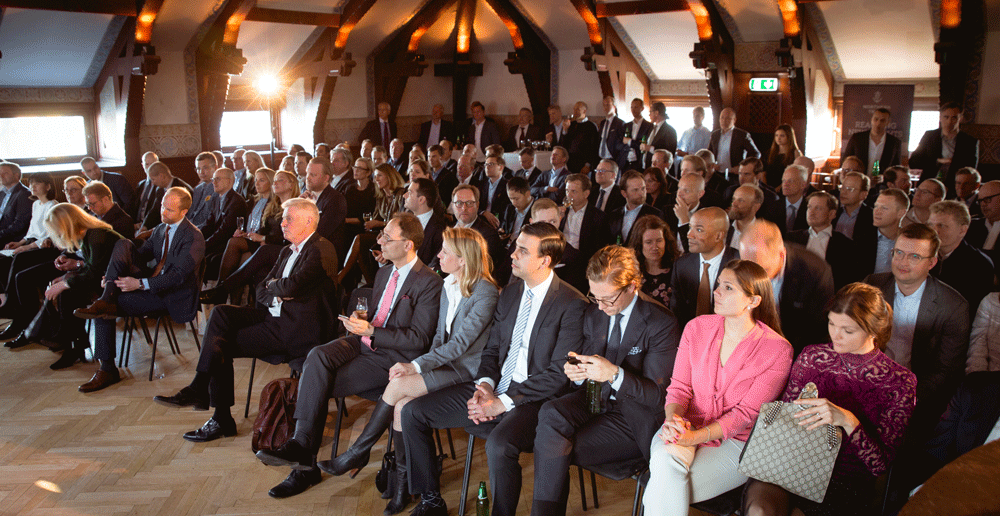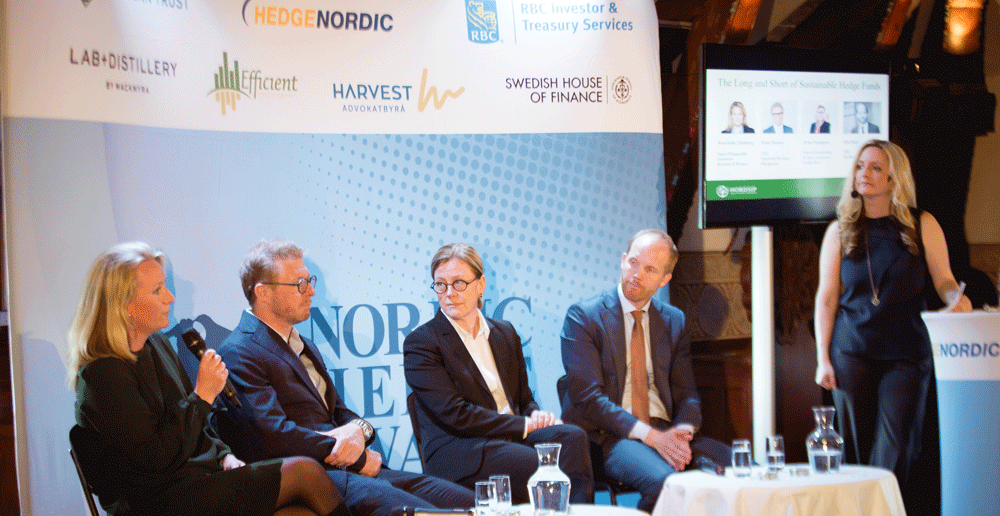Stockholm (HedgeNordic) – At this year’s Nordic Hedge Award ceremony, which is held in Stockholm and rewards the best hedge funds included in the Nordic Hedge Index universe of funds, HedgeNordic’s sister platform NordSIP had the privilege to host and moderate a panel on sustainable hedge funds.
The panellists were Ann-Sofie Odenberg, Head of Responsible Investment at Brummer & Partners, Simon Reinius, CEO at Optimized Portfolio Management, Ulrika Hasselgren, Head of Sustainability & Impact Investment at Danske Bank and Eric Eidolf, CEO at Nordkinn Asset Management. The discussion was moderated by Aline Reichenberg Gustafsson, Editor-in-Chief of NordSIP.
Status of the sustainable hedge fund industry
The discussion started with an overview of the latest trend in sustainability practices adoption among hedge funds. Odenberg reminds us that sustainability is not equal for all the hedge fund strategies. “Equity long/short strategies are often more advanced, as it is easier to integrate ESG criteria in your investment decisions,” she says. “For other strategies, it is not that straightforward. But over the last couple of years, the perception has changed even for those strategies where sustainability is less obvious. Many more people realise that they can find a way to tailor responsible investing to their organisation and their strategy.”
Odenberg mentions that the UN PRI has started working on five work streams for different hedge fund strategies, to propose guidelines to help hedge funds integrated their principles. “I look forward to seeing the launch of these guidelines due in September. I am sure that they will push the agenda even further.”
“True ESG integration is about investing. ESG then becomes a factor along with other investment factors. It should be embedded in a holistic approach to valuing a company.”
Reinius, who selects hedge funds for his fund of hedge funds, says he sees an acceleration in the adoption of sustainability in the market. “It is still a challenge for a CTA manager, for example, to integrate sustainability. But five years ago, very few hedge fund managers thought that it was important to look at it. Now all of them know it is a crucial aspect of investing, and at least, they have a good explanation if they are not doing something. The trend is definitely positive.”
Hasselgren agrees that the field of sustainability is continuously developing, also in the hedge fund space. “That said,” she adds, “we have to take a step back and talk about what we mean by sustainability, ESG, or ESG integration which is a term on many policy documents and presentation materials. The way I view it is that true ESG integration is about investing. ESG then becomes a factor along with other investment factors. It should be embedded in a holistic approach to valuing a company. This has been an important part of the dialogue with hedge funds in the past. When you take all the acronyms and the greenwashing away, it is the factors that remain relevant.”
Expectations of hedge fund investors
“The UN has set a deadline in 2030 to reach those goals. With only 12 years to go, what does that mean for us?”
For Eidolf, sustainability is also relevant with regards to how the actual fund company is run and managed. “If fund managers look at the G,” he says, “whether they care about ESG or not, they can all relate to the necessity of protecting their investors, regarding their product structure, transparency and independence, for instance.”
“When it comes to the implementation,” Eidolf adds, “we are a fixed income macro hedge fund, and it is not straightforward for us to implement ESG factors in our investment strategy. So for inspiration, we look at the Sustainable Development Goals (SDGs) developed by the UN a couple of years ago. The 17 goals are not necessarily equally relevant in the context of hedge funds, but what is key is that the UN has set a deadline in 2030 to reach those goals. With only 12 years to go, what does that mean for us? What can we do to contribute? For us, that’s a good way to engage with our investors on the subject.”
“If we look at the number of sustainability reporting frameworks, there are more than 400! That is a staggering number.”
Talking about how investors view hedge funds, Hasselgren believes defining expectations and ambitions is crucial. “The challenge for all of us is to be clear on what we mean and how we view this area,” she says. “If we look at the number of sustainability reporting frameworks, there are more than 400! That is a staggering number. Add to that the number of stewardship codes, investor initiatives, identified sustainability and ESG factors, questionnaires. We need to pause and ask ourselves what this is all about. It is not about investing, but about something else that lands on investors and asset managers. They need to constantly answer questions from society, stakeholders, and of course also from the regulators. As a bank, we view ourselves a. a pillar of society, so we owe these answers to our stakeholders. For our investments, however, and when it comes to our hedge funds in particular, it’s crucial that we view sustainability as a factor.”
Where to start
“You should show investors that you care and that if you had better processes and measurements available you would implement them.”
The panellists also gave the audience some practical advice. Both Reinius and Odenberg agree that the minimum you can do as a fund manager is to sign the PRI. As its name suggests, the PRI proposes a set of principles (6 in total) that guide investors in becoming more responsible in their responsible investing. “Sign the PRI and then read the guidelines thoroughly,” proposes Reinius. “You should show investors that you care and that if you had better processes and measurements available you would implement them.”
“I would talk to my investors and try to figure out what their values and expectations are, and then be transparent.”
“Start by defining what responsible investment mean for your type of investment strategy,” adds Odenberg. “As a minimum, I would talk to my investors and try to figure out what their values and expectations are, and then be transparent.”
“Your approach has to be genuine and close to your business.”
Eidolf continues on the theme of meeting investors’ expectations, and he insists on keeping it authentic. “I subscribe to the idea that it is key to understand what responsible investment means to you because it can be subjective,” he says. “If you take all of your investors and line them up, at one end you put the most dedicated ESG investor and at the other end, one that is not so interested. Wherever they stand, all investors must be able to relate to what you are trying to do. Your approach has to be genuine and close to your business.”
“If you don’t have your own agenda, your own solid platform to stand on, then you will be like a leaf going here and there.”
Hasselgren picks up on the importance for hedge funds to set up their unique sustainability agenda. “We live in a world where there are stakeholders everywhere. If you don’t have your own agenda, your own solid platform to stand on, then you will be like a leaf going here and there. It is crucial to identify for yourself how E, S or G matters for your investment.”
Where the future leads
“The hedge fund community can support the corporate world, by showing companies what is going to happen and suggest how they can position themselves.”
For Reinius hedge funds may have an opportunity to step up. “Hedge fund managers have a clear role to play because they are free to act,” he explains. “Much more so than many investors, especially those governed by large organisations. The world and more specifically the companies that we invest in will be affected by different environmental issues going forward. Carbon-related issues are only a start. I believe that companies will find themselves in situations similar to those the internet has created in many industries. Many companies will be affected by climate change one way or the other, and the hedge fund community can support the corporate world, by showing companies what is going to happen and suggest how they can position themselves.”
“There is an opportunity to analyse vast quantities of information and to build that into our hedge funds.”
Odenberg sees possibilities in technological innovations. “I’m going to use two buzzwords,” she starts, “the analysis of big data and artificial intelligence. As we said, it is often quite difficult for systematic quantitative funds to figure out how to integrate ESG signals in their algorithms and models. Exploring big data and artificial intelligence may be an answer for them. There is an opportunity to analyse vast quantities of information and to build that into hedge funds. I hope to see those types of solutions emerge.”
“Are short-term hedge funds traders bad for the markets, or do they provide liquidity, and thereby contribute positively to a sustainable financial system?”
Eidolf shares some of the more low-tech solutions his firm has recently implemented. “There are several ways we can move forward, in multiple aspects. For example, a year ago we introduced an investor ombudsman on our board. The idea is simple: add an independent board member that solely focuses on the interests of the investors. We have gained on two fronts: we added a very competent person on the board while ensuring that we keep the investors’ point of view in mind in all dimensions of our business.”
Another idea Eidolf contemplates is the role hedge funds can play more widely in the financial system. “At the PRI, for example, there is an active debate about the short-term nature of some investment strategies. Are short-term hedge funds traders bad for the markets, or do they provide liquidity, and thereby contribute positively to a sustainable financial system? There is some work to be done at the PRI level to make sure hedge funds are perceived as less dangerous for the community.”


